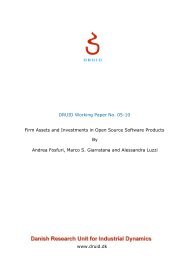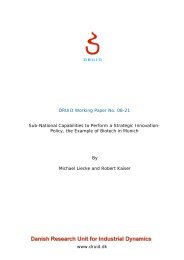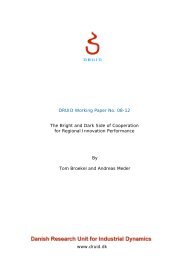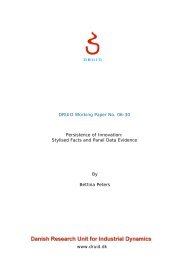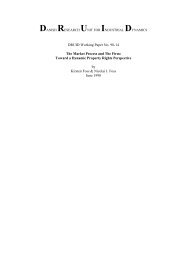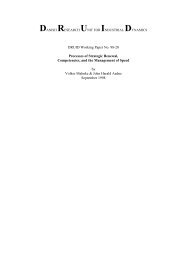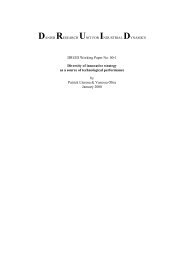danish research unit for industrial dynamics druid working paper no ...
danish research unit for industrial dynamics druid working paper no ...
danish research unit for industrial dynamics druid working paper no ...
You also want an ePaper? Increase the reach of your titles
YUMPU automatically turns print PDFs into web optimized ePapers that Google loves.
27the capacity to undertake certain tasks whereas 'intentions trust' refers more on the partner'shonesty to keep its promises (Sako, 1997) 8 .With regard to our previous discussion most of our case studies show strong ties betweenfirms and organisational trust. This result has to be analysed carefully because of the natureof the links be<strong>for</strong>e agreement takes place. Most of the time the agreement is just the<strong>for</strong>malisation of previous work over many years. Mercedes and Kuka <strong>for</strong> example wereinteracting from the end of the 70's. It is <strong>no</strong>t surprising in these conditions thatorganisational trust exists! Fiat-Comau and Renault -Renault Automation are in the sameposition whereas Mercedes-Comau have cooperated <strong>for</strong> only <strong>for</strong> five years but have alwayssucceeded in implementing very in<strong>no</strong>vative and risky projects. Organisational trust is inthis latter case more based on competence and a very good understanding facilitating thetransfer of solutions experienced in other agreements and their hybridisation according tonew constraints, than intentions or familiarity.*Organisational assetsRules are collective k<strong>no</strong>wledge that eco<strong>no</strong>mise individual k<strong>no</strong>wledge (ie they substitutecomplexity of individual k<strong>no</strong>wledge <strong>for</strong> the simplicity of collective k<strong>no</strong>wledge (Favereau,1989, 1995). More precisely, a rule is a prescription one may con<strong>for</strong>m to and whichindicates what behaviour is allowed or prohibited in a particular context (Shima<strong>no</strong>ff, 1980).In the case of cooperation, rules bring some mechanisms which may facilitate coordinationbetween two distant corporate culture. Rules may be considered as patterns of actionsexperienced in a local context be<strong>for</strong>e being repeated. They may be trans<strong>for</strong>med andreproduced through time if they tend to bring some robust responses to organisationalcoordination. We make a distinction between local rules which are specific domains and areproduced in some particular context which is difficult to reproduce, and "meta rules", <strong>no</strong>ndomain-specific because there is ample scope to interpret them and a capacity to reproducethem in a<strong>no</strong>ther context because they are general e<strong>no</strong>ugh in their principles to bring somemethodological k<strong>no</strong>wledge possible to transfer or to adapt in a<strong>no</strong>ther agreement. "Metarules" are defined as redeployable assets.8 If these <strong>no</strong>tions are conceptually distinct, they are often related in practice because the belief that yourpartner is able to undertake certain tasks is also related to its intentions to undertake them <strong>no</strong>t in a<strong>no</strong>pportunistic manner.



